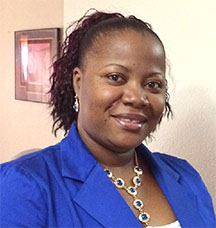Elizabeth Bunbury hopes that Guyana’s hosting of the March 31 to April 2 Conference of the Caribbean Association of Home Economists (CAHE) will not just raise the profile of Home Economics, but help erect a bridge between the discipline as subject on the curriculum and a vehicle for employment creation and broadening the base of the country’s economy, particularly its manufacturing sector.
She has little time to discuss the stigmatization of the discipline of Home Economics as the favoured pursuit of intellectual slouches. It is, she says, what it is, and the challenge that confronts the sector is to work to repair its own image.
She believes that the Guyana Association of Home Economists (GAHE) is the ideal vehicle with which to pursue that task though she concedes that it has not done nearly enough over the years.

Elizabeth Bunbury
Her own gravitation towards Home Economics came after her mother’s death when she was just 12 and the attendant necessity to cultivate home-making skills in order to effectively assume the role of care-giver to a younger sister.
After 21 years in teaching, having graduated from the Cyril Potter College of Education (CPCE) and returned there as a part-time lecturer, she has moved on. In the process she has tutored her own fair share of students whose low sense of self-esteem had led them to find rescue in Home Economics.
Then, she said, the challenge reposed not so much in teaching the subject but in repairing the self-esteem of some of her students.
Numbered among those, she says, was a young man who has now migrated and is currently deploying his skills taught in the Home Economics class to his studies towards becoming a chef; and a professional nurse who only recognized during her formal training that there was a nexus between the health sciences taught as part of the Home Economics curriculum and nursing.
One of her real regrets is that as a country we have not done nearly enough to utilise the skills that inhere in the discipline of Home Economics to strengthen those various other disciplines that are, even now, seeking to make their way in the Guyana economy.
The Carnegie School of Home Economics, she says, is a “standout institution” if for no other reason than the fact that it has offered the skills that it has honed to a number of local industries, not least the hotel and tourism sectors and to cruise liners. The individual successes are there to see. She wants them to materialize in greater clusters.
Perhaps, Bunbury says, much of the reason why Home Economics has been unable to secure the image it deserves might have to do with the relative failure of the profession to promote itself effectively; “to truly cause people to understand what the discipline is.” Simply put, the profession is largely misunderstood.
The image of girls in aprons titivating in kitchens has been the one that comes most readily to mind, but the Beterverwagting, East Coast Demerara Secondary School teacher notes that Home Economics embraces a range of disciplines that include Food and Nutrition, Clothing and Textiles and Money Management.
She believes that each of these skills is more than relevant in an economy that is not only growing in the service-driven sectors including the food and entertainment industries but is also showing clear signs of gravitating towards self-employment. “The problem that we might well have is that with the stigma keeping some students away from the discipline we may not have enough students benefiting from the training to become professionals,” she says.
At CPCE, Bunbury specialized in Textiles (though the CPCE curriculum equipped her to teach a broader range of subjects) and while she remains anchored in the teaching profession she does not rule out the possibility of utilizing her skills to venture into the world of entrepreneurship.
In the short term she wants to encourage her colleague teachers to encourage students (and parents) to recognize and explore the professional possibilities that repose in the pursuit of Home Economics. “There are sectors of the economy that need those skills and we must continue to use those developments in the tourism, entertainment, clothing, hotel and food sectors to let them know that Home Economics offers some perfectly worthwhile career opportunities. “Parents must see Home Economics as going beyond just cooking. It delivers an experience and a body of knowledge that is applicable in numerous walks of like,” she says.




